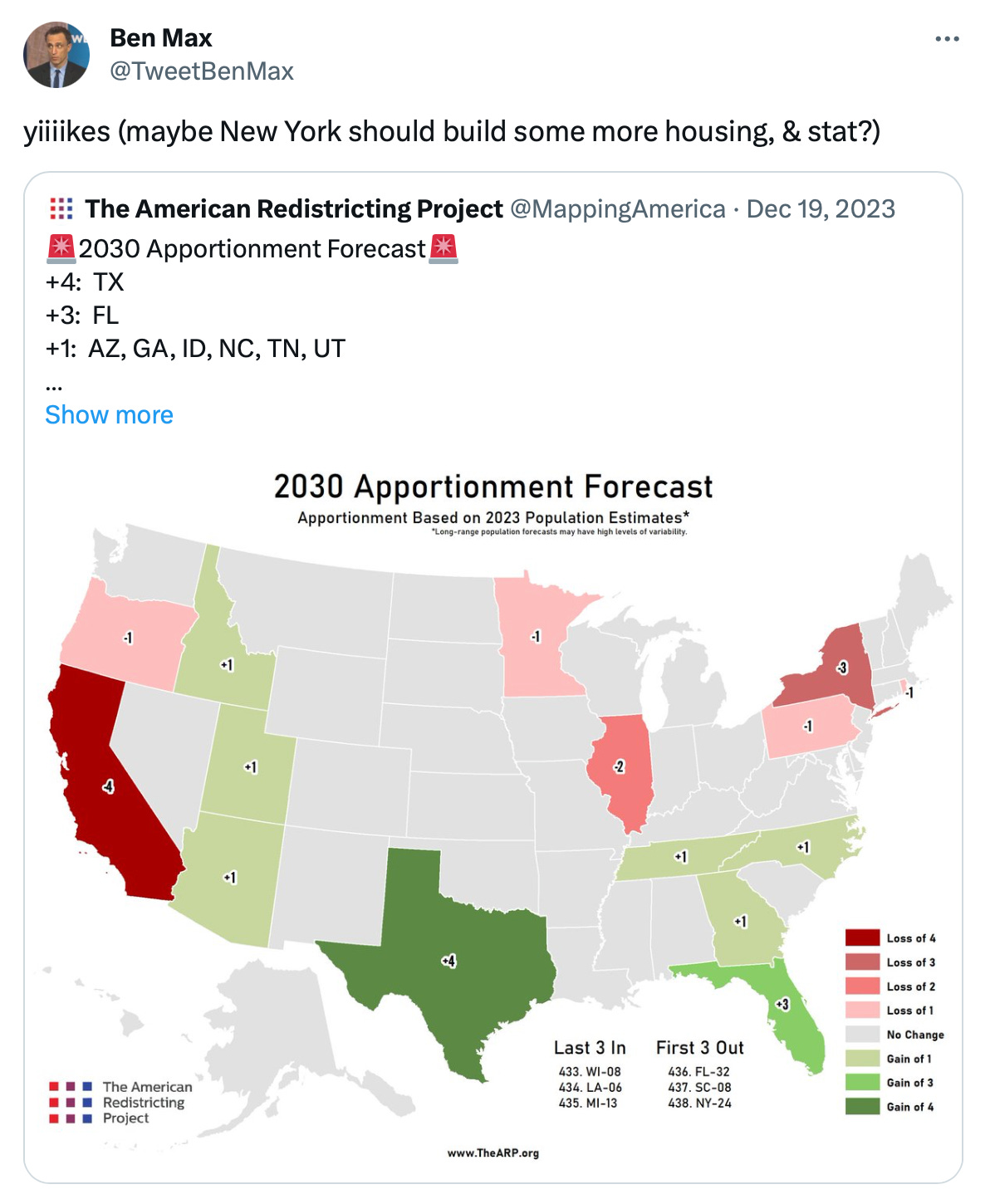How New York Politicians Are Making A Second Trump Term More Likely
Blue-state Democrats are partially to blame for the fragility of our democracy
Hi All,
New Hampshire voters are heading to the polls today in what may be the last stand of a non-Trump GOP candidate for president, bringing us ever-closer to the brink of a second Trump term.
It’s not just the White House on the line in November: Senate and House elections will determine whether either party can achieve unified control of the federal government.
Trump v. Biden 2.0 headlines are constant, overshadowing what’s happening in New York’s City Hall and State Capitol.
Also missing? The connection between local policy fights and the fate of American democracy.
Indeed, if New York’s Democratic leaders continue to miss the boat on abating housing costs and climate change, they’re going to be partially responsible if the ship of state sinks. Below are three big reasons why.
Ryder
1. If Democrats can’t solve problems, why vote for them?
In 2022, New York Republicans carried six House districts that Joe Biden won in 2020. Why? Inflation was a big piece of the puzzle. Alongside abortion, it was the top issue motivating voters. But underappreciated in the hand-wringing about inflation was the fact that staggering home and rent prices, driven up by shortages, were largely to blame.
As Politico noted, “when it comes to the single biggest driver of runaway prices, Washington’s hands are mostly tied.” It’s the steps being taken—or, more often, not taken—locally that are keeping housing prices high, driving inflation and hurting Democrats in elections.
The one hurting most? Joe Biden. Young voters, who he won by 24 points in 2020, tell this story perfectly: “Many Americans view the economy negatively even though unemployment is low and wage growth has been strong. Younger voters cite housing as a particular source of concern: Among respondents 18 to 34 in a recent Morning Consult survey, it placed second only to inflation overall.”
Now, Biden is tied or behind Trump with young voters—a death knell to his chances for reelection. Blue-state Democrats tweeting about Trump but failing to address young voters’ concerns are helping the election denier ex-president they say they want to stop.
2. Population loss means a harder US House and Presidential map
Even if Dems can carry the Electoral College and win back House seats, they might not have either for long. Current projections suggest that New York will lose three seats after the next census due to interstate population shifts. Fewer House seats means a harder map for Democrats in Congress and in the Electoral College. (Remember, each House seat is an electoral vote.)
What’s behind the population loss? No surprise: it’s high rents pushing New Yorkers out of state.
Where are they going? To red states like Texas and Florida that make building housing easier and thus keep their cost of living down. As those states grow, they’ll send more Republicans to the House of Representatives—and make it easier for a national GOP no longer invested in America’s democratic experiment to win presidential elections.
3. If democracy can’t solve problems, why keep it?
In New York, only 18% of voters turned out for last year’s city elections. The abysmal number may reflect a “loss of faith” in the system to solve problems. That skepticism of government isn’t just bad for Democrats, the boosters of government potential—it’s bad for democracy itself.
A 2022 national poll found that 75% of older Americans strongly agreed that democracy is the best form of government available, but only 27% of Gen Z respondents felt the same way. That intergenerational erosion in dedication to democracy is far more insidious than any partisan trendlines.
We know what our problems are, even beyond housing costs. There’s the existential threat of climate change, particularly motivating to young voters. There are 80,000 annual deaths by opioid overdose, 50,000 by guns, 40,000 by cars. There’s inequity of access to good jobs, healthcare, and childcare in our sprawling and segregated communities.
Young people are asking why they should believe in a system of government that’s so unresponsive to the basic needs of its citizens. We’re running out of time to give them better answers.





